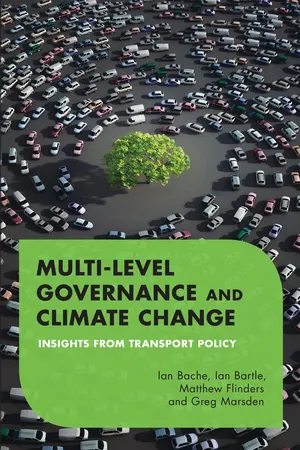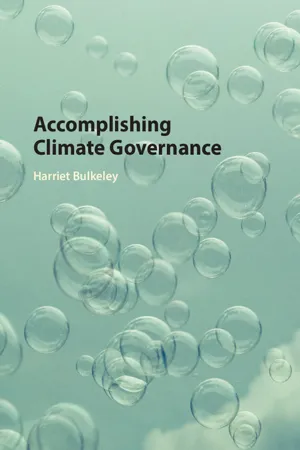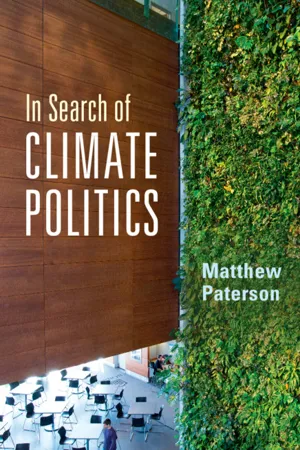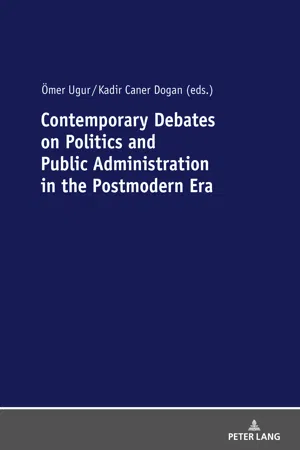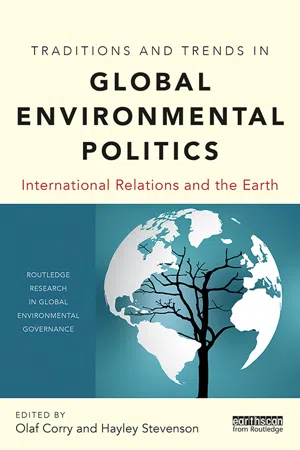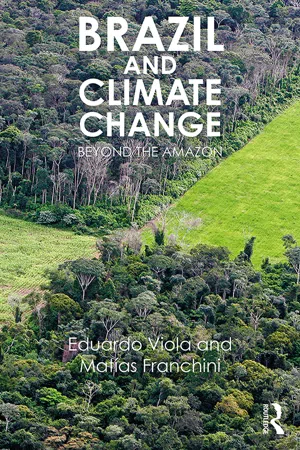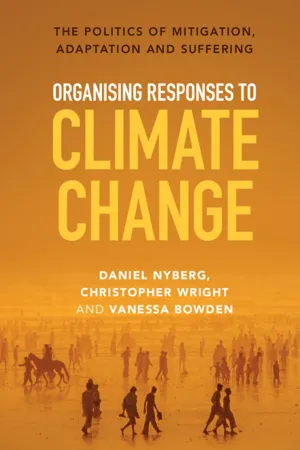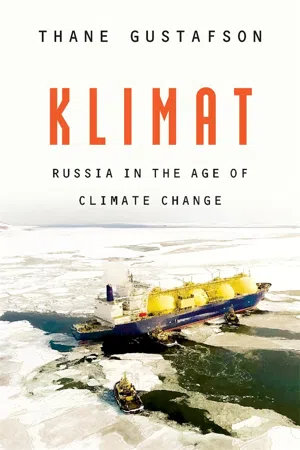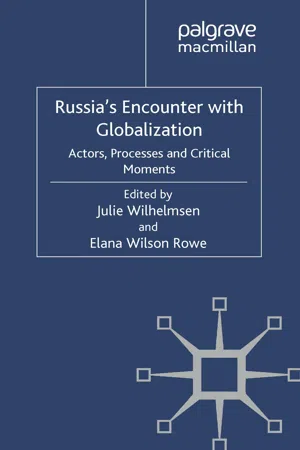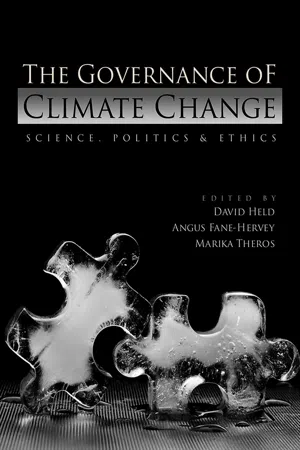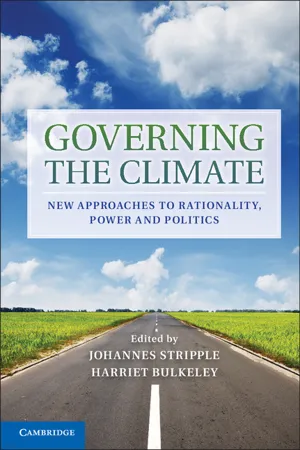Politics & International Relations
Challenge of Climate Change
The challenge of climate change refers to the global issue of rising temperatures, extreme weather events, and environmental degradation caused by human activities. It encompasses the need for international cooperation, policy development, and sustainable practices to mitigate its impacts and ensure the well-being of future generations. Addressing this challenge requires a multifaceted approach involving scientific research, technological innovation, and coordinated efforts across nations.
Written by Perlego with AI-assistance
Related key terms
1 of 5
11 Key excerpts on "Challenge of Climate Change"
- eBook - ePub
Multilevel Governance and Climate Change
Insights From Transport Policy
- Ian Bache, Ian Bartle, Matthew Flinders, Greg Marsden(Authors)
- 2015(Publication Date)
- Rowman & Littlefield Publishers(Publisher)
With the available science base set out, the central aim of this chapter is to tease apart exactly what makes the climate change challenge apparently so intractable. What is it that seems to make the climate change challenge such a difficult issue for politicians and policymakers to deal with? In order to answer this question, we offer three core (and inter-related) explanations that focus on institutions, society and democratic politics. The second section therefore focuses on the institutional governance of climate change and highlights the manner in which a complex institutional architecture creates a gap between the scale of the challenge and the capacity for a coordinated response. But to define the climate change challenge simply as one of institutional failure would be to over-simplify the issue. Indeed, climate change is a ‘super-wicked’ problem due to a number of far deeper and socially embedded dimensions of modern governance that need to be acknowledged if the challenge is to be addressed. The third section therefore shifts the lens of analysis from the institutional sphere to the social sphere and focuses on social consumption, everyday lifestyle practices and transition theory. What this third section therefore offers is a critique of the dominant ‘ABC approach’ (Shove 2010) with its emphasis on an individualised and choice-based policy response to the climate change challenge and a richer account of why change away from high-energy, carbon-intense patterns of behaviour appears so difficult. This focus on ‘institutional governance’ and what might be termed ‘social governance’ flows into the fourth section’s focus on ‘democratic governance’ and a discussion about the politics of climate change - eBook - PDF
- Harriet Bulkeley(Author)
- 2015(Publication Date)
- Cambridge University Press(Publisher)
Towards Global Governance The now commonplace framing of climate change as a global problem requiring collective solutions owes its roots to the emergence of the climate change agenda in the late 1980s as one requiring an international scientific and policy response (Paterson 1996). Conceived as one of 4 Climate Problematics several global environmental issues requiring international action, climate change came to be regarded as problem of the atmospheric commons that required new institutions capable of managing the challenge of ensuring effective action. During the 1990s, analysis of the politics of climate change was subsequently dominated by accounts of the formation of international regimes and the ways in which nation-states and other actors, from scientific communities to nongovernmental organisations (NGOs) and business interests, were able to effectively shape and direct global climate politics (Bulkeley & Newell 2015). Largely determined by the division within political science between studies of the international arena on the one hand, seen as the domain of international relations, and studies of domestic politics on the other, regarded as the arena of political science proper, accounts of the climate change regime as the locus of climate politics were soon subject to critique (Newell and Paterson 1998; Paterson 1996). Adopting the language of governance, which was at the time gaining popularity across the social sciences, research began to analyse climate change politics through a set of different frames that regarded the global nature of the issue not in absolute terms but rather in relation to the globalising and networked nature of the economy and society. - eBook - PDF
- Matthew Paterson(Author)
- 2021(Publication Date)
- Cambridge University Press(Publisher)
2 In Search of Climate Politics To think politically about climate change, we need to elaborate the arguments I sketched out via the University of Ottawa divestment story in Chapter 1. First, we need to conceptualize explicitly what we mean by politics. Second, we need to think about the political drivers of (and obstacles to) climate change action, a question I will suggest can be understood via a notion of cultural political economy. Third, we need to think about the dynamics that arise out of these first two, which I take to be two-fold: On the one hand a recurring dynamic between depoliticization and repoliticization, and on the other hand a tension I characterize as ‘purification vs. complexity’, between the instinct to want to find simple ‘solutions’ or enemies to fight, and the multidimensional qualities of the high carbon world that needs to be transformed. To start, however, it is perhaps worth thinking a little about how climate change is commonly conceptualized and framed, in public discourse as well as across various academic disciplines, in order to tease out what the politics of these specific climate change frames are. 2.1 Politics in Existing Framings of Climate Change There are many such frames and I gloss over lots of nuance here, but I group them into three for the current purposes: System adjustment and maintenance frames, systemic inequalities and contestation frames, and system transformation frames. 2.1.1 System Adjustment and Maintenance Frames These tend to conceptualize climate change, and propose interventions in relation to it, from within the dominant sets of ideas within the contemporary social order, and aim, implicitly or explicitly, to minimize the impacts of climate policy on that order. At a broad level we can see this in the almost-obsessive focus among policy- makers – in rich and poor countries alike – with what the impacts of any specific 14 - Ömer Ugur, Kadir Caner Dogan(Authors)
- 2019(Publication Date)
- Peter Lang Group(Publisher)
Because the problems, which were regarded as simple environmental issues until the 1960s, started to be perceived as a problem that interest the future of the world and that shall be evaluated with a holistic view in the later years. Actually, it is not possible for nation states nei- ther to keep the environmental pollution created within their borders in their border nor to close their borders against the pollution coming from other states. And this inevitably necessitated the cooperation among states at an international level and becoming a significant topic in world politics in this sense. Climate change, which affects all the countries directly in one form or another, is among the most important subjects. It is a fact that global warming poses a different problem from others because of its scale and also of the fact that it is related with the future. Since this truth is recognized by the states and other actors in the recent years, it is frequently observed that a climate regime and a gover- nance based on this regime were tries to be established in order to fight against this problem at an international level. In spite of these developments, due to the complicated and problematic nature of climate change process it would not be right to state that establishment of this structure happened quite easily. Although countries acknowledged that global warming is a serious problem within the international fight against climate change, there are a great number of factors hindering cooperation. There are factors regarding traditional international re- lations such as authority gap, sovereignty problem and power struggle as well as issues arising from environmental cooperation such as the tension between Northern-Southern countries, fear to be deceived, free riding and uncertainty of gaining profit.- eBook - ePub
Traditions and Trends in Global Environmental Politics
International Relations and the Earth
- Olaf Corry, Hayley Stevenson, Olaf Corry, Hayley Stevenson(Authors)
- 2017(Publication Date)
- Routledge(Publisher)
Barnett (2001: 76) suggests that ‘economic and energy security takes priority over environmental security’. This gives some hint as to why climate issues are forced into a conventional security framework, due to a national power calculus. However, the long chains of production, supply and demand are not conducive to national autonomy, and the relationship between states and markets is strained. The transnational and global issue of climate change is not amenable to a purely national strategy, whatever local initiatives might be taken. So, in considering a political turn, it is such structural features that may be subject to some twisting as both states and markets are encompassed in wider social trends that influence climate policy. While more traditional security concerns are evident in talk of international conflict, a human development perspective advancing ‘human security’ would have the global benefit of showing that there are sustainable ways to meet basic human needs. Since economic development is understood to create energy needs, then this suggests awareness of a potential structural shift in international politics that provides both relevance and substance to the idea of ‘climate security’, even if policy development is still catching up.If ‘climate security’ is to be achieved, it would have to be clear what aspect of our relationship to the climate system is to be secured. Security for the existing sources of climate problems (‘business as usual’) through mitigation and adaptation adjustments will not be conducive to long-term security from the consequences of climate change. In this respect, climate clearly threatens ‘human security’ (Barnett and Adger 2007), which suggests rather more than a military planning issue (Briggs 2012). What’s more, there is still some debate about the urgency of the problem. Lacy (2005: 38) raises a pertinent query: ‘should we accept a hierarchy of security that places the threat of human-generated climate change into the safe-category of a Second-Order problem?’ It is not clear that simple efficiency gains in some locations will curtail global growth, given the power of consumption. So it is necessary to both think and act globally to arrive at a consensus on ‘sufficiency’ in which equity for locals is central. - eBook - PDF
Brazil and Climate Change
Beyond the Amazon
- Viola Eduardo, Matías Franchini(Authors)
- 2017(Publication Date)
- Routledge(Publisher)
18 Climate change and international relations However, these analytical approaches, in our view, are incomplete because they focus on only one aspect of the role of states in the political economy of climate change: either domestic policy, foreign policy, or emissions trajectory. There are two exceptions, the Climate Performance Index of Burck, Marten, and Bals (2014) and the Cooperation within the Regime work of Bättig, Brander, and Imboden (2008), but these also have speci fi c problems. In the fi rst case, Burck, Marten, and Bals (2014) give excessive weight to the emissions path (80%), and they rely on specialists ’ opinions to evaluate the path of climate poli-cies, and not on objective criteria, as we do. As for Bättig, Brander, and Imboden (2008), they only focus on international policies — whether countries had rati fi ed the UNFCCC and the Kyoto Protocol, and whether countries had made fi nan-cial contributions to the UNFCCC — and the path of the carbon intensity of per capita GDP. They do not consider the domestic policy realm and the per capita level of emissions, which are both crucial to understanding countries ’ position in the political economy of climate change. Our approach, on the other hand, aggregates both the political dimension (foreign and domestic climate policy) and the GHG emissions pro fi le dimension. In doing so, we avoid the problems of reductionism present in the other propo-sals. From one side, the trajectory of emissions is the decisive issue to measure the dynamic of a country in the global carbon cycle and how much better or worse it is behaving in relation to the whole. However, that trend can be altered by political measures, even when it could be a timing gap between the willingness of a country to decarbonize and the trajectory of emissions, because in many situa-tions the new policies take time to have a signi fi cant e ff ect on emissions trajec-tory. - eBook - PDF
Organising Responses to Climate Change
The Politics of Mitigation, Adaptation and Suffering
- Daniel Nyberg, Christopher Wright, Vanessa Bowden(Authors)
- 2022(Publication Date)
- Cambridge University Press(Publisher)
In this opening chapter, we outline the broader context of this issue and set out our central argument – that the climate crisis is the product of a specific political economy: global capitalism. This is a model of economic and social development that has become so fundamental to political understanding that it is rarely questioned, let alone challenged. Overall, while it takes various context-dependent forms, capitalism relies on the fervent pursuit of continued economic growth and fossil energy consumption on a compound basis ad infinitum. The key actors in this process are global corporations, state-owned enterprises, allied governments and political parties, along with the supporting institu- tional apparatus of think tanks, consultancies and media whose power and finances depend on a perpetuation of economic growth at all costs. Although the catastrophic environmental consequences of this tra- jectory have long been sidelined and ignored, the debt now falls due: this is the age of consequences. As climate change and associated environmental crises demonstrate, a focus on growth and consumption 4 The Politics of Climate Change disproportionally benefits the wealthy within the Global North and advanced economies and has resulted in a fundamental shift in the basic Earth system. The dramatic economic change that has accelerated over the two centuries since the first Industrial Revolution has upended the stable climate of the past 12,000 years of the Holocene. Humanity has now engineered a new and much more unstable geological epoch: the Anthropocene (Steffen et al., 2015). This has become a very different planet – one that climate scientists argue will likely challenge the continued existence of organised human society. We begin this chapter by reflecting on the recent pandemic and how it revealed the underlying vulnerability of a globalised, interconnected economy to the disruptions of the natural world. - eBook - PDF
Klimat
Russia in the Age of Climate Change
- Thane Gustafson(Author)
- 2021(Publication Date)
- Harvard University Press(Publisher)
1 THE POLITICS OF CLIMATE CHANGE IN RUSSIA Climate change is rapidly emerging as a political issue in Russia. It has been a long time coming. Russian climate scientists first began calling attention to the dangers of global warming more than forty years ago, but their warnings were largely disregarded. In the last five years or so, however, awareness of climate change has increasingly penetrated official circles; ministries and companies have formed climate teams and are issuing position papers; politicians and business leaders have begun to take sides in increasingly intense debates; and the media and the public have taken notice. Climate change, one might say, has come of age, at least in Moscow, if much less so in the rest of the country. What has not yet happened is any real action. Today’s Russia, though increasingly authoritarian, is far from mono-lithic. Behind the façade of one-man rule, it is an active political scene where individuals and groups jostle for preference and influence. The evolving debate over climate change is a prime example. In this chapter and throughout this book, we shall meet some of the major players. Some are climate scientists; most are not. They range from reformers, for whom climate change is an opportunity to promote a broader agenda of economic reform, to conservatives, who reject the view that climate change is a threat to the established model of natural-resource production and export. Some are insider-courtiers, close to the seat 18 Klimat of power in the Kremlin; others are outsiders who see climate change as a means to influence policy or promote themselves. Some are busi-ness and policy entrepreneurs. Still others are advisors in consultan-cies and think tanks, which are increasingly present in Russia. To a striking degree, these players’ competing views are being expressed in public. Thanks to the internet, the game has become wide open. These players can be grouped, broadly, into four categories. - eBook - PDF
Russia's Encounter with Globalisation
Actors, Processes and Critical Moments
- J. Wilhelmsen, E. Wilson Rowe, Elana Wilson Rowe, J. Wilhelmsen, E. Wilson Rowe, Elana Wilson Rowe(Authors)
- 2011(Publication Date)
- Palgrave Macmillan(Publisher)
For exam- ple, China has been instrumental in advocating a differentiation 62 Encountering Climate Change between ‘essential’ and ‘luxury’ emissions. Russia, by contrast, has remained largely passive in international negotiations, waiting to see if and how its own interests can be maximized without seeking to change the discourse or framework of the negotiations themselves. Turning to the USA, we see that the Russian leadership’s latitude in taking climate positions at the international level could be an object of transatlantic envy. American climate positions are closely linked to the raucous and powerful forces of electoral politics, interest groups and local economic concerns that might have to ‘pay the price for regulatory efforts’ (Harrison, 2010, p. 67). For Russia, as well as both China and the United States, the politics of climate change is closely intertwined with economic and energy policy. Mitigating climate change through international cooperation involves reducing greenhouse gas emissions, which ties directly into some fundamental domestic economic challenges Russia inherited from the Soviet Union: the need for greater energy efficiency and economic modernization. In many ways, how Russia will engage in international climate politics has much to do with the extent to which those involved domestically can succeed in making robust links between the internal and external spheres of the state – across the boundary along which foreign policy and the challenges of globalization are situated. Notes 1. Climate change ties in with economic modernization and maximization of Russia’s capacity as an oil and gas exporter through the pursuit of greater energy efficiency in oil and gas extraction, industry and personal consumption. - eBook - ePub
- David Held, Marika Theros, Angus Fane-Hervey, David Held, Marika Theros, Angus Fane-Hervey, David Held, Marika Theros, Angus Fane-Hervey, David Held, Marika Theros, Angus Fane-Hervey(Authors)
- 2013(Publication Date)
- Polity(Publisher)
4We should take into account the social and political consequences of this anticipation in the present. The ‘catastrophic’ aspect of climate change is not, for example, the drying up of the Aral Sea or Lake Chad or the drought in Australia, it is the proof that these must be ascribed to human interventions and that they alter or destroy the foundations of (the) societal order. The credibility of the catastrophic, however, creates in the present the counter-forces of its prevention – perhaps. Just as human actions are considered/deemed to be causally responsible for climate change and are thus part of the problem, they can also be part of the solution (that the forecast catastrophe does not come to pass in the end does not necessarily prove the forecast false, and can also be proof of its correctness, in the sense that it has had the effect in the present of a self-refuting prophecy). Anyone who concerns themselves with climate change runs into this paradox: the dominant discourse of climate change, the one which has a virtual monopoly in the sphere of world politics, points to the future. From a sociological perspective, however, climate change is already here in the present, and is transforming the political, economic, technical-scientific, legal, military and cultural landscapes fundamentally and with rapid speed. That is, risk is a matter of anticipation of present-futures (Beck 1992 [1986]; Adam and Van Loon 2000).At the same time, climate change has moved from ‘subpolitics’ to ‘superpolitics’: the potential of the issue of climate change is so enormous that it is capable of reshaping and transforming the social and political landscape. No political party dares to look as if it is ignoring climate change. It is an extremely effective mobilizer of concern, as the Australian federal elections of 2007 showed. Droughts were being linked to manmade global warming and the then-ruling coalition of the Liberal Party and the National Party was a bit slow in learning to incorporate the right ‘climate change politics’ into its political language and suddenly faced decisive defeat at the polls. For those voting who experienced the drought, whether it was the result of manmade climate change or not, knowledge and vocabulary to put it in those terms had come from social movements, scientists, the media and politicians. These subpolitical forces were marginal forces, often ridiculed for their apparently extreme vocabulary, and initially not well connected. Now though, their concerns have suddenly been promoted to ‘superpolitics’. Al Gore, for example, received a Nobel Prize for his slideshow on climate change. Neither he nor his allies are particularly powerful actors, yet they managed to make a significant contribution to re-shaping the present political agenda on a global scale. - eBook - PDF
Governing the Climate
New Approaches to Rationality, Power and Politics
- Johannes Stripple, Harriet Bulkeley(Authors)
- 2013(Publication Date)
- Cambridge University Press(Publisher)
Abingdon: Routledge. Ruzek, M. (2010). Earth System Science in a Nutshell. [Online] Available at: [http://serc. carleton.edu/introgeo/earthsystem/nutshell/index.html]. Accessed 4 January 2013. Shepherd, J. G. (2009). Geoengineering the Climate: Science, Governance and Uncertainty. Design 1, 1–98. Tickell C. (2010). Earth Systems Science: Are We Pushing Gaia Too Hard? [Online] Available at: [http://www.le.ac.uk/ebulletin-archive/ebulletin/ features/2000–2009/2006/11/nparticle.2006–11–20.html]. Accessed 2 January 2013. 234 Corry U.S. Global Change Program (2009). Climate Literacy. The Essential Principles of Climate Sciences. Washington, DC: U.S. Global Change Program. [Online] Available at: [http:// downloads.climatescience.gov/Literacy/Climate Literacy Booklet Low-Res.pdf.]. Accessed 18 January 2013. Walker, R. B. J. (1993). Inside/Outside: International Relations as Political Theory. Cambridge: Cambridge University Press. Waltz, K. N. (1979). Theory of International Politics. New York: McGraw-Hill, Inc. Weart, S. R. (2003). The Discovery of Global Warming. Cambridge, MA: Harvard University Press. Wendt, A. (1999). Social Theory of International Politics (Cambridge Studies in International Relations). Cambridge: Cambridge University Press. 235 13 Climate Change Multiple Samuel Randalls Introduction Concerns about the climate are not new to the twentieth and twenty-first century. Historians have highlighted the ways populations have been governed to live with, work in and manage different kinds of climates (e.g. see Fleming and Jankovic 2011). Yet the concept of ‘global climate change’ has become undoubtedly power- ful in the latter half of the twentieth century and has been adopted in diverse calls for societal intervention in the name of defending sound science, a stable climate and enhancing sustainability.
Index pages curate the most relevant extracts from our library of academic textbooks. They’ve been created using an in-house natural language model (NLM), each adding context and meaning to key research topics.
